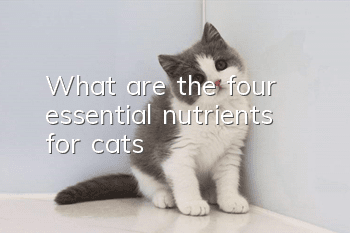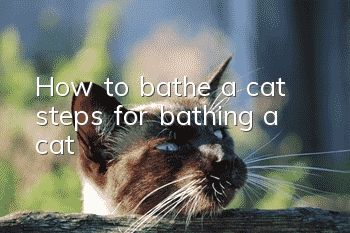What are the four essential nutrients for cats?

Four essential nutrients for cats:
1. Carbohydrates
Mainly include starch and fiber. Starch is the main source of energy for the cat's body and contributes to the oxidation of fat, which is mainly broken down into glucose in the intestines for absorption and utilization. Cellulose is not easy to digest, but it helps peristalsis to maintain the cat's normal digestive activity.
Carbohydrates are energy feeds. Although we cannot feed everything to cats, some foods that people eat can still be used to feed them, such as rice, cornmeal, potatoes, etc., which all contain carbohydrates. For what cats need, we can grind the above food into powder and add some fat or cooking oil to feed kittens. Some cats eat sweets (cane rice or lactose) or milk. Due to the fermentation of lactose, it is easy to cause diarrhea. Allergy to albumin in milk can also cause diarrhea. If the above situation occurs. You should stop eating in time.
2. Fat
Kittens should be fed less, otherwise they will become too obese. Adult cats need a lot of fat to maintain their daily needs.
3. Water
Water is the most important nutrient in animals. Because water is widely distributed and easily available, and is abundant in most foods, it is often overlooked. In fact, water is extremely important and is an indispensable substance in a cat’s life. It helps in the transportation, digestion, absorption, dissolution and elimination of certain waste products produced by metabolism. It can also reduce joint friction. Cats drink water and Removes water and regulates body temperature. If a cat loses about 40% of its body weight in stored carbohydrates, fats and proteins, it can still survive. However, if it loses up to 10% of its body weight in water, it will cause severe dysfunction, and if it loses up to 20% of its body weight, it will Cause animal death. Therefore, when a cat is severely dehydrated or is unwilling or unable to drink due to disease, it is necessary to provide water through clinical rehydration therapy.
Cats are one of the more thirsty animals. Some people experimented by locking cats in cages without allowing them to drink water. After 6 weeks, the cats were still alive. Generally, the body of an adult cat contains nearly 70% of its body weight in water. This water mainly comes from drinking, food and the oxidation of nutrients in the body. For example, 100 grams of protein can produce about 40 ml of water when oxidized in the body, and 100 grams of carbohydrates can produce 55 ml of water. 100 grams of fat is 107 milliliters of water. Although cats have water in their bodies, for normal metabolism and metabolic balance, cats still need to obtain a certain amount of water every day. Under normal circumstances, adult cats need 40 to 60 ml of water per kilogram of body weight per day, and kittens need 60 to 80 ml of water. Of course, water demand is related to temperature, food moisture content, etc. When the outside temperature is 23°C, cats of different ages need water per kilogram of body weight per day when they eat feed containing about 75% moisture.
4. Protein
Cats need high-protein food, mainly animal protein such as meat, fish, eggs, liverOrgans, kidneys, etc., all contribute to the growth and development of cats. Fresh food will be welcomed by cats, but feeding monotonous food for a long time will make cats feel bored and lead to food refusal, which will lead to nutritional deficiencies in cats. Therefore, after feeding your cat one kind of cat food for a long time, you can change it to a new taste.
- Why do cats like to lick people?
- Introducing several effective methods to treat hairy bulbs
- Can cats eat egg tarts?
- What is feline viral rhinotracheitis?
- Cat has pus and yellow eye feces in one eye
- Can pet cats get on the subway?
- What should I do if my American shorthair cat drools a lot?
- Introduction to matters related to sterilization of female cats Why should female cats be neutered?
- Why is the cat losing hair in patches?
- Cat sleeps with his eyes half-closed



